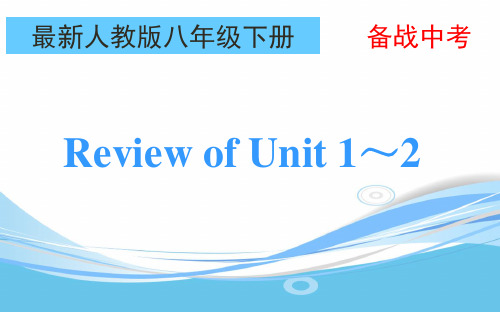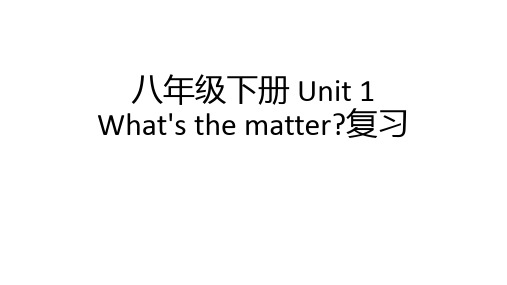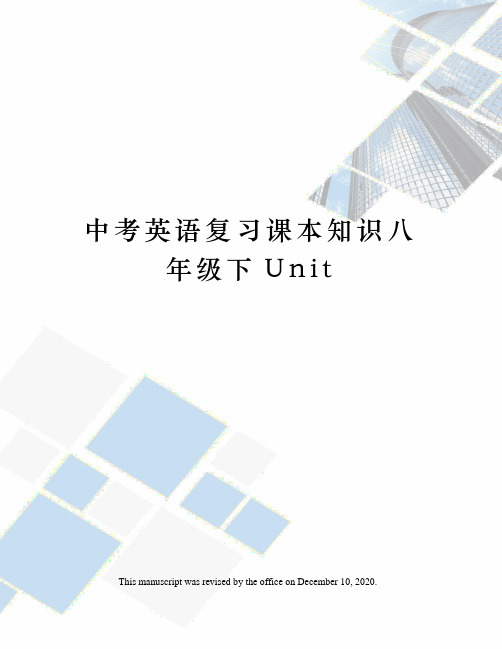中考英语复习课本知识八年级下Unit资料
- 格式:docx
- 大小:89.29 KB
- 文档页数:10


中考英语总复习资料第11讲八年级英语下册Units 5-6一、重点词汇1.begin(v.)→(n.)开始2.heavily(adv.)→(adj.)重的3.suddenly(adv.)→(adj.)突然的4.strange(adj.)→(n.)陌生人5.report(v.&n.)→(n.)报告者6.wood(n.)→(adj.)木制的7.ice(n.)→(adj.)冰冷的8.completely(adv.)→(v.)完成9.silence(n.)→(adj.)沉寂的10.truth(n.)→(adj.)真实的11.shoot(v.)→(过去式)→(过去分词) 12.husband(n.)→(n.对应词)妻子13.gold(n.&adj.)→(adj.)金子制的二、重点短语1.(闹钟)发出响声2.接电话3.感觉像是4.睡着;进入梦乡5.逐渐变弱6.看一看7.费力地前进8.沉默;无声9.拆除;往下拽;记录10.首先11.忙于做某事12.醒来13.有点儿;稍微14.代替;反而15.变成16.爱上17.结婚18.从前19.出版;开花20.第一次三、重点句型1.当暴风雨来时,他正在做什么?What he when the rainstorm came?2.当琳达在睡觉时,詹妮正在帮玛丽做作业。
While Linda ,Jenny Mary her homework.3.外面没有光亮,感觉像是半夜。
no light outside,it midnight.4.我难以清楚地想起那以后的事因为我很害怕。
I had clearly after that because I was very afraid.5.移山似乎是不太可能的。
It doesn't very to move a mountain.6.对于这个故事,你们有不同的观点,并且你们两个人都是对的。
You have different about the story,and of you are wrong.7.你听到继母正计划着杀死我们吗?Did you hear our stepmother kill us?8.除非我们(这样)做,否则我们不会找到出路。

中考新版八年级英语下册第1至第10单元知识点总结+单元知识点归纳中考新版八年级英语下册第1至第10单元知识点总结Unit 1 What’s the matter?一、基础知识1. What’ s the matter with you?= What’s the trouble with you?= What’ s wrong with you? 你怎么了?【注】:matter 和trouble 为名词,其前可加the 或形容词性物主代词,wrong 是adj. 不能加the2. have a cold=catch a cold=have the flu 感冒have a fever发烧have a cough 咳嗽have a stomachache胃疼,肚子疼have a toothache牙疼have a headache头疼3. 身体部位+ache(疼痛)构成新的复合词stomach+ache=stomachachehead+ache=headachetooth+ache=toothacheback+ache=backache后背痛4. much too+形容词,意为太...... ,too much+名词,意为很多,大量。
5. lie down躺下,lie lay lain lying 躺lay laid laid laying放/ 下蛋lie lied lied lying 说谎6. maybe“或许”may be,是情态动词+be的结构,意为“可能,也许”7. get off (the bus)下(公交车)get on上车get into 进入get to到达get through穿过;完成8.agree with sth.同意某事agree to sb. 同意某人的意见9. be in trouble 遇到麻烦make trouble制造麻烦have trouble (in) doing sth.=have difficulties (in) doing sth做......有麻烦。



中考英语复习课本知识八年级下U n i tThis manuscript was revised by the office on December 10, 2020.2010中考英语复习课本知识整理八年级下Unit6 How long have you been collecting shells【知识梳理】【课文解析】1. since的用法:(1)conj.①(引导时间状语从句,从句中常用过去时,主句用一般时态或完成时)自从……以来;……以后。
eg.It was years since l had seen her.自从我见到她(到那时)又过去好几年了。
his just a week since we arrived here.我们到这儿刚好有一周了。
②(引起原因状语从句,通常置于句首)既然;因为eg.Since he says so,it must be true.既然他这么说,那一定是真的。
(2)prep.自……以来eg.I have lived here since childhood.自小我就住在这儿。
He hasn't been home sincel993.1993年以来他还没有回过家。
(3)adv.①(与完成时态连用)从那以后;后来eg.He left the city in 1985 and has returned only once since.他1985年离开这座城市,自那以后只回来过一次。
②以前(4)构成短语:ever since 从那以后(一直)long since 很久以前;早已2. since,from和for(1)from是介词,后接名词、动名词,表示事情的开始点,以from短语作状语时,句中的谓语动词可用一般现在、过去和将来时,如:(4)stop sb.(from)doing sth. 表示“叫某人停止做某事,阻止某人做某事”。
例如:What can stop me(my)going 有什么能阻止我去呢Nothing shall stop us from studying.什么都不能阻止我们学习。
2010中考英语复习课本知识整理八年级下Unit 10It's a nice day, isn't it【知识梳理】【课文解析】1. last持续,为延续性动词,可与一段时间及How long 连用如:America Civil War lasted for four years.美国内战持续了四年。
Our holidays lasted for ten days.我们休了十天假。
2. always频度副词,意思是:永远,一直,总是(1)always,usually,often,sometimes,hardly ever和never是频度副词,与疑问词how often对应。
它在句中位于实义动词之前,情态动词(may,can,would,could等)、助动词(do,did,does,have,had等)、连系动词(be)之后。
He is always wearing that blue shirt.他总是穿着那件蓝色的衬衣。
I always think of her in that dress.我总是想起她穿着那件连衣裙的样子。
(2)always与进行时连用,常带有感情色彩。
The boy is always telling lies.这孩子总是说谎。
(表示生气)He is always talking to his father like that他老是那样和他父亲说话。
(表示不满)3. alone(1)alone形容词,意为“单独的;独一无二的”,只可作表语。
I am not alone in this opinion.不只是我一个有这想法。
(2)alone也可作副词,意为“单独,独自”。
He alone knows the secret.只有他一人知道秘密。
She lived alone.她独居。
The key alone will open the door.只有这把钥匙能开这个门。
人教八年级(下) Units 1—2 单元重点回顾续表可能拥有“幸运儿”(狗名)。
语法1.情态动词should,shouldn't与could(详见第二编P140~P141)2.反身代词(详见第二编P124)3.不定式作宾语、状语和宾语补足语(详见第二编P139)4.情态动词could用于礼貌请求与允许(详见第二编P140)话题Unit 1 Health and first aid(健康与急救)Unit 2 Volunteering and charity(志愿服务与慈善)★单元重难点突破expect (八下Unit 1 P3)【举例透析】①He expe cted to hear from Mary.他期待收到玛丽的来信。
(expect作动词,意为“预料;期待”。
短语:期待做某事expect to__do sth.= look forward to doing sth.)②I expect my sister to come back early so that we can go to Jolin's concert together.我期待我的姐姐早点回来以便我们能一起去听蔡依林的音乐会。
(短语:期待某人做某事 expect sb.to__do sth.)③They are in trouble,but I expect that they can deal with it themselves.他们正处于困境中,但是我期望他们能自己处理。
(用法:expect+ that从句期待……)(D)1.—Does he expect ______ his dream this time?—Yes,he looks forward to ______ his dream come true.A.achieving;makeB.achieving;to makeC.to achieve;to makeD.to achieve;making2.(原创题)我不期望他会来我的生日聚会。
2010中考英语复习课本知识整理八年级下Unit 2 What should I do【知识梳理】【课文解析】1.My parents want me to stay at home every night.我的父母让我每天晚上都呆在家里。
want sb. to do sth.让某人做某事妈妈让她每天早上喝牛奶。
Mother wants her to drink milk every morning.父母想让我们打扫自己的房间。
Parents want us to clean our own rooms.* 常用的情态动词有:can, could, may, might, must, shall, should, will,would这九大情态动词;其他的还有ought to, need, dare 等。
一、九大情态动词的时态关系:1. 现在式can -- 过去式could2. 现在式may -- 过去式might3. 现在式shall -- 过去式should4. 现在式will -- 过去式would5. 现在式must -- 过去式must (常用had to来代替)二、情态动词表示“可能”或“预测”(can, could, will, would, shall, should, must, ought to)(1)can 和could 用于表示“可能”或“预测”:1. He can't be at home. (否定句)他不可能在家。
2. Can the news be true ? (将情态动词can 置于主语the news 前就成疑问句)这消息可能是真的吗?3. Anybody can make mistake. (只表示理论上的可能性)任何人都可能犯错误。
(2)may 和might 用于表示“事实上的可能性”或“预测”:1. It may rain tomorrow. (表示可能会发生) 明天可能会下雨。
2. It may snow later this afternoon. (表示预测)今天下午可能会下雪。
(4)may 和might 用于表示“许可”(口语中多用can )1. You may take a walk. (表示给予许可)你可以散散步。
2. You might read the story for me. (比may更婉转)是否请给我读一读这故事。
3. May I make a suggestion?我可以提个建议吗?4. Might I take a look of your work?我看看您的大作行吗?5. Students may not make noise in the library. (may not 表示不许可或禁止)学生不得在图书馆里吵闹。
6. If I may say so, you are not right. (用于条件句,表示请求)你是不对的,如果我可以这么说的话。
(5)must 用于表示“禁止”,“不准”:1. Cars must not be parked here. (must not表示不许可)此地不准停车。
2. All of you mustn't fishing in the pool. (must not 语气方面比may not 更强) 你们不准在池里钓鱼。
【典型例题解析】例1.—What a beautiful sweater!—How much did you ______for it?A.take B. cost C. pay D. spend解析此题考查花费的区别。
此题主语是“人”,并且pay常与for连用,意为“为……付款”,故此题选C。
答案C例2.You shouldn’t ______here. The baby ______.A. play; sleepingB. to play; is sleepingC. plays, sleepsD. play; is sleeping正解D错因分析此题做错的原因是没有熟练掌握情态动词的用法,情态动词后面给动词原形。
在第一个句子中should是情态动词,后面应用动词原形,所以排除B、C选项,根据句意第二个句子应用现在进行时态,结构是am/ is /are+ v-ing形式。
故选D。
例3.—Could you please ______me your bike?—Sorry, Amy ______it an hour ago.A. Lend, borrowB. Lend, borrowedC. borrow; lentD. borrow; lend正解B错因分析此题所错的原因是没有掌握borrow和lend的用法。
borrow和lend都有“借”的意思,borrow是“借入”的意思;lend是“借出”的意思。
此外相应的句型也不一样,borrow……from……,lend sth. to sb.或lend sb. sth。
第二个句子.根据an hour ago可以确定是一般过去时态。
例4.(2008年遵义)A: What _______ under your bed, Langlang?B: Oh, where are my basketball shoes, Mom?A. do you doB. are you doingC. did you do【析】此题主要时态。
A项是一般现在时态,B项是现在进行时态,C项是过去时态。
从答语“他在找他的篮球运动鞋”来看,可以知道问句应该是:现在进行时态。
故此题选B。
答案BI.根据句意及首字母提示补全单词1.This work is too difficult.It doesn’t f me.2.The school things i pens,pencils,erasers and books.3.If you have a p,you can ask me for help.4.I’m very u and don’t know what to do.5.Most children a after-school clubs.Ⅱ.根据句意用括号中所给单词的适当形式填空1.You should tell him to get__________(different) clothes.2.Parents should give their children more time and__________ (free) to relax.3.Jim is__________(good) at drawing than Lucy.4.John__________(write) something when I__________(go) to see him.5.What would you like__________(drink)?Ⅲ.句型转换1.We should help him write letters.(改为否定句)We_____ _____him write letters.2.They should buy some new clothes.(对画线部分提问)_____ _____they buy?3.I had dumplings for supper yesterday.(对画线部分提问)_____ _____you __________ for supper yesterday?4.It was cold last week.(对画线部分提问)_____was_____ _____ _____last week?5.This is a good idea.(改为感叹句)_____ _____ _____idea this is!Ⅳ.根据汉语意思补全句子1.你应当好好与他相处,不应该与他吵架。
You_____ _____ _____well _____ him,and don’t__________with him.2.我们每天应该尽可能多地运动。
We should have exercise___________ ______________ _______________every day.3.谁会驾驶汽车?Who______ _______ _______drive the car?4.你应该给他一张足球赛的票。
You should__________him a _______ _______ a football match.5.我认为你应该向你的朋友请求帮助。
I think you should__________your friends__________ _______.V.单项选择( )1.He had something to write down and asked me for_______.A.a paper B.some papersC.some pieces of paper’s D.a piece of paper( )2.My family is very poor,so we have to live in a small__________.A.apartment B.buildingC.space station D.house( )3.__________of clothes do you have like this?A.How much B.How manyC.How much suit D.How many suits( )4.Mrs Shute wouldn’t leave the TV set,__________her children were waiting for their supper.A.if B.because C.even though D.as soon as ( )5.Oh,Danny.It’s raining outside.You’d better__________your raincoat.A.put on B.put up C.dress D.to wear( )6.—You’d better hurry,my dear.—Just a minute.It won’t__________me long to change.A.spend B.take C.cost D.pay( )7.You__________home right now.A.needn’t to go B.needn’t goC.don’t need go D.needn’t going( )8.—I’m sorry I left my exercise book at home.—It doesn’t matter.But don’t forget to__________it to school tomorrow.A.bring B.take C.leave D.carry( )9.Steven always wears __________clothes.They are very different from the others.A.trendy B.original C.inexpensive D.cheap( )10.Danger! __________!A.Keep out B.Keep on C.keep on going D Keeping( )11.He the pen on the ground just now.A.droped B.dropped C.fall D.fell( )12.They__________each other and they__________argue.A.should help;should B.should help;shouldn’tC.shouldn’t help;should D.shouldn’t help;shouldn’t( )13.—Can I talk to you for a minute,Lucy?—Sure, I have__________time.A.a few B.1ittle C.few D.a little( )14.This question isn’t worth__________.A.answer B.to answer C.answering D.answers( )15.People will fly to the moon__________vacations.A.for B.to C.in D.atⅥ.用适当的话语补全对话A:Good morning,doctor.B:Good morning.1.A:I don’t feel well and I cough a lot.B:2A:Ever since yesterday.B:3A:Yes.I have.It’s a little higher.B:Open your mouth and say“Ah”.A:4,doctor?B:Nothing serious.Take this medicine three times a day and have a good rest.5A:Thank you,doctor.B:You’re welcome.Ⅶ.完形填空Christmas was coming.A lot of 1were going to town.They hoped to 2some vegetables,fruit and meat in the market.And then they were going to buy some 3for their families.A bus came.They tried to 4.Robert,a strong young man,rushed in first.He occupied (占) two 5.One for his girl friend Mable andthe other for himself.The bus started,and Robert had a look 6the bus.He saw a lot of people 7there.There were some old men among them.He hurried to 8his eyes.Mable found it and thought he felt 9and asked,“What’s wrong with you,dear?”“10,”answered the kindhearted (好心肠) young man.“I can’t bear(忍心)to see the poor old men!”friends!Everyone screamed! Then I said sorry to my friends.They laughed because it didn’t matter.It was funny.Jackie said,“It tastes good!’’My friends went into the bathroom and washed their faces.Afterwards,Mon cut the cake and everyone had a piece.All my guests left around four o’clock.I helped Mom clean up the mess.I had a great birthday.It was the best part of my summer holiday.( )1.Jenny had her birthday party______________.A.in a restaurant B.at schoolC.at a fri end’s house D.at home( )2.One of Jenny’s friends gave her______________A.a video B.some snacksC.a video game D.some balloons( )3.Jenny’s friends arrived at her home______________.A.in the morning B.at two o’clockC.at half past three D.at four o’clock( )4.Jenny blew out the candles and she______________.A.ate all the cakeB.blew cream on the floorC.blew cream all over her friendsD.sang Happy Birthday( )5.Jenny’s friends______________after Jenny blew out the candles.A.were angry B.criedC.were upset D.laughedBMany people have the wrong idea about pigs.Pigs are actually very clean animals.On farms,they live in dirty places.So,they become very dirty.In the wild,pigs keep very clean.They ale also really smart.They may be smarter than dogs.They can learn things from people.Pigs are very friendly animals.Some people raise (喂养) them as pets.Of course,people keep the small kind,not the big kind.Small pigs are very cute.And they don’t b reak things in the house.Big pigs usually live outside on farms,not in peopl e’s houses.( )6.Which words can describe pigs?A.Dirty and stupid.B.Nervous and strange.C.Dangerous and unfriendly.D.Clever and friendly.( )7.What does the underlined words“in the wild”mean?A.On farms.B.In nature.C.Being crazy.D.In people’s houses.( )8.Which of the following is true?A.Pigs like to be dirty.B.People can teach pigs things.C.Dogs are smarter than pigs.D.Only farmers raise pigs.( )9.What kind of pigs are raised in people’s houses?A.The very big kind.B.The ugly kind.C.This kind from farms.D.The small kind.( )10.What is NOT mentioned(提及)in this passage?A.Raising dogs.B.Pigs on farms and in the wild.C.Pigs as pets.D.People’s wrong ideas about pigs.Ⅸ.书面表达以“My Favorite Subject”为题写一篇70词左右的短文。